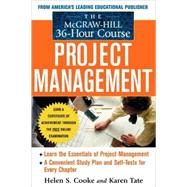
What is included with this book?
Helen Cooke (Chicago, IL) is a project management veteran with extensive experience in consultation, implementation, and teaching.
Karen Tate (Cincinnati, OH) is the founder and owner of two successful management consulting firms.
|
1 | (30) | |||
|
1 | (1) | |||
|
1 | (10) | |||
|
11 | (5) | |||
|
16 | (8) | |||
|
24 | (1) | |||
|
25 | (1) | |||
|
26 | (1) | |||
|
27 | (4) | |||
|
31 | (30) | |||
|
31 | (1) | |||
|
31 | (7) | |||
|
38 | (4) | |||
|
42 | (9) | |||
|
51 | (2) | |||
|
53 | (4) | |||
|
57 | (1) | |||
|
57 | (4) | |||
|
61 | (26) | |||
|
61 | (1) | |||
|
62 | (1) | |||
|
63 | (9) | |||
|
72 | (8) | |||
|
80 | (3) | |||
|
83 | (1) | |||
|
83 | (4) | |||
|
87 | (16) | |||
|
87 | (1) | |||
|
88 | (4) | |||
|
92 | (5) | |||
|
97 | (2) | |||
|
99 | (1) | |||
|
100 | (3) | |||
|
103 | (18) | |||
|
103 | (1) | |||
|
103 | (8) | |||
|
111 | (6) | |||
|
117 | (1) | |||
|
118 | (1) | |||
|
119 | (2) | |||
|
121 | (22) | |||
|
121 | (1) | |||
|
122 | (1) | |||
|
122 | (5) | |||
|
127 | (7) | |||
|
134 | (4) | |||
|
138 | (1) | |||
|
139 | (2) | |||
|
141 | (1) | |||
|
142 | (1) | |||
|
143 | (22) | |||
|
143 | (1) | |||
|
144 | (5) | |||
|
149 | (1) | |||
|
150 | (7) | |||
|
157 | (2) | |||
|
159 | (1) | |||
|
160 | (2) | |||
|
162 | (1) | |||
|
162 | (1) | |||
|
163 | (2) | |||
|
165 | (14) | |||
|
165 | (1) | |||
|
166 | (1) | |||
|
166 | (1) | |||
|
167 | (1) | |||
|
168 | (1) | |||
|
168 | (2) | |||
|
170 | (4) | |||
|
174 | (1) | |||
|
175 | (1) | |||
|
175 | (1) | |||
|
176 | (1) | |||
|
177 | (2) | |||
|
179 | (20) | |||
|
179 | (1) | |||
|
180 | (1) | |||
|
180 | (4) | |||
|
184 | (1) | |||
|
185 | (2) | |||
|
187 | (1) | |||
|
188 | (3) | |||
|
191 | (1) | |||
|
191 | (2) | |||
|
193 | (1) | |||
|
193 | (2) | |||
|
195 | (1) | |||
|
196 | (1) | |||
|
197 | (2) | |||
| 10. The Context for Project Management | 199 | (16) | |||
|
199 | (1) | |||
|
200 | (4) | |||
|
204 | (1) | |||
|
205 | (1) | |||
|
206 | (5) | |||
|
211 | (1) | |||
|
212 | (1) | |||
|
212 | (1) | |||
|
213 | (2) | |||
| 11. Controlling Project Work | 215 | (16) | |||
|
215 | (2) | |||
|
217 | (7) | |||
|
224 | (2) | |||
|
226 | (1) | |||
|
227 | (1) | |||
|
228 | (1) | |||
|
229 | (2) | |||
| 12. Organizational Project Management Maturity | 231 | (28) | |||
|
231 | (1) | |||
|
232 | (2) | |||
|
234 | (1) | |||
|
235 | (5) | |||
|
240 | (1) | |||
|
240 | (2) | |||
|
242 | (4) | |||
|
246 | (3) | |||
|
249 | (5) | |||
|
254 | (1) | |||
|
255 | (1) | |||
|
256 | (1) | |||
|
256 | (3) | |||
| 13. Conclusion | 259 | (8) | |||
|
262 | (1) | |||
|
263 | (1) | |||
|
264 | (3) | |||
| Appendix A: Process Model | 267 | (8) | |||
| Appendix B: Templates | 275 | (22) | |||
| Appendix C: Organizational Assessment | 297 | (6) | |||
| Appendix D: Case Study | 303 | (6) | |||
| Appendix E: Deliverables' Life Cycles | 309 | (4) | |||
| Notes | 313 | (6) | |||
| Answer Key to End-of-Chapter Questions | 319 | (4) | |||
| Index | 323 | ||||
| Final Examination | E-1 |
The New copy of this book will include any supplemental materials advertised. Please check the title of the book to determine if it should include any access cards, study guides, lab manuals, CDs, etc.
The Used, Rental and eBook copies of this book are not guaranteed to include any supplemental materials. Typically, only the book itself is included. This is true even if the title states it includes any access cards, study guides, lab manuals, CDs, etc.